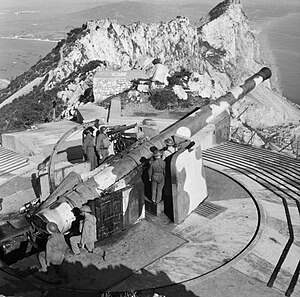BL 9.2 inch gun Mk IX - X
| Ordnance BL 9.2 inch gun Mk IX, Mk X | |
|---|---|

Mk X gun facing north at Breakneck Battery on Gibraltar January 1942.
|
|
| Type |
Naval gun Coast defence gun |
| Place of origin | United Kingdom |
| Service history | |
| In service | 1899–1950s |
| Used by |
Royal Navy |
| Production history | |
| Manufacturer |
Elswick Ordnance Company Vickers Beardmores |
| Variants | Mk IX, Mk X, Mk XIV |
| Specifications | |
| Weight | Mk IX: 27 tons barrel & breech Mk X: 28 tons |
| Barrel length | Mk IX: 35 ft 10 in (10.922 m) Mk X: 35 ft 9 in (10.897 m) bore (46.7 cal) |
|
|
|
| Shell | 380 lb (170 kg) |
| Calibre | 9.2-inch (233.7 mm) |
| Breech | Welin interrupted screw |
| Elevation | 0° to 15° (on Mark V Barbette mount) |
| Traverse | 360° (on Mark V Barbette mount) |
| Muzzle velocity | 2,643 ft/s (806 m/s) |
| Maximum firing range | 29,200 yd (26,700 m) |
Royal Navy
Royal Garrison Artillery, Royal Artillery from 1922 Royal Australian Artillery
Royal Canadian Artillery
South African Artillery
Portugal
The BL 9.2 inch guns Mk IX and Mk X were British breech loading 9.2 inch guns of 46.7 calibre, in service from 1899 to the 1950s as naval and coast defence guns. They had possibly the longest, most varied and successful service history of any British heavy ordnance.
These guns succeeded the 9.2 inch Mk VIII and increased the bore length from 40 to 46.7 calibres, increasing the muzzle velocity from 2,347 feet per second (715 m/s) to 2,643 feet per second (806 m/s).
The Mk IX was designed as a coast defence gun, with a three-motion breech. Only fourteen were built and the Mk X, introduced in 1900, incorporated a single-motion breech and changed rifling, succeeded them. As coastal artillery, the Mk X remained in service in Britain until 1956, and in Portugal until 1998. 284 of the Mark X version were built by Vickers, of which 28 examples are known to survive today, all except one fitted on barbette mounts. One in Cape Town is on a disappearing mount.
The 9.2 inch Mk XI gun introduced in 1908 increased the bore length to 50 calibres in an attempt to increase the velocity still further, but proved unsuccessful in service and was phased out by 1920. The Mk X was hence the final Mark of 9.2 inch guns in British Commonwealth service.
These were medium-velocity wire-wound guns with Welin interrupted screw breeches.
Mark X guns were mounted on :
Four guns of 45 calibres (414 inches) bore produced by Elswick Ordnance Company were mounted in two twin turrets on the Greek cruiser Georgios Averof in 1910, instead of the 10-inch guns mounted on her sisters of the Pisa-class in Italian service. These were similar to the four Vickers 45-calibre export model guns used by Britain as railway artillery on the Western Front in World War I under the designation BL 9.2 inch gun Mark XIV. They fired the same 380-pound shell using the same 120-pound cordite charge as the British service Mk X gun, and it may be assumed that its performance was very similar.
...
Wikipedia
